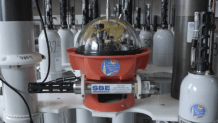Underwater robots may be a key to understanding how the climate is changing and how our sea levels are rising. This year might be a preview of what the future holds.
Researchers at UC San Diego’s Scripps Institution of Oceanography are building and deploying what they call Argo floats, all over the world. These under water robots can dive for days at a time, measuring temperature and salinity of ocean water to see how the ocean is changing.
The program started in San Diego a couple decades ago, and there are now dozens of countries also building and deploying these floats. More than 4,000 of those autonomous robots are now surveying the world’s oceans. They've done millions of dives. Each robot can work on its own, unassisted for up to five years on a single battery. The data is sent back via satellite and then available to the public for free. And the latest models, Deep ARGO floats, can dive roughly four miles to the ocean floor, to monitor how the ocean is changing in some of the most remote places on earth.

Get top local stories in Southern California delivered to you every morning. Sign up for NBC LA's News Headlines newsletter.
“It’s giving us data and eyes into this region we’ve never been able to see before,” says Scripps Scientist Sarah Purkey. “We have learned a ton.”
She says what they’re learning lately is a little alarming.
“The deep ocean is changing,” says Purkey. “We see this very steady long-term trend. It is increasing. Every year it has been increasing. Every year we’re getting hotter, and hotter and hotter.”
U.S. & World
News from around the country and around the globe
One reason that matters is because as water warms, it expands, meaning as our oceans get warmer, sea levels will rise. Higher sea levels can cause flooding, and erosion, both issues the California coast is already experiencing, especially this past El Niño winter.
And this is not just a coastal issue. Oceans drive weather all over the world. The warmer water during an El Niño year can change weather patterns everywhere, meaning a year like this could be a preview of the kind of weather we would see more regularly in future decades.
“Some places are going to get very wet. Some places are going to get very hot. Some places are going to be in severe drought,” says Purkey. “Whether you live in California or you live in Kansas, the ocean is a very important part of the climate system, and the oceans really matter for everybody regardless of where you live.”



